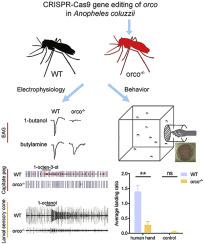Insect Biochemistry and Molecular Biology ( IF 3.2 ) Pub Date : 2020-11-11 , DOI: 10.1016/j.ibmb.2020.103497 Huahua Sun 1 , Feng Liu 1 , Zi Ye 1 , Adam Baker 1 , Laurence J Zwiebel 1

|
Mosquitoes rely heavily on their olfactory systems for host seeking, selection of oviposition sites, and avoiding predators and other environmental dangers. Of these behaviors, the preferential selection of a human blood-meal host drives the vectorial capacity of anthropophilic female Anopheles coluzzii mosquitoes. Olfactory receptor neurons (ORNs) are dispersed across several appendages on the head and express an obligate odorant receptor co-receptor (Orco) coupled with a “tuning” odorant receptor (OR) to form heteromeric, odor-gated ion channels in the membrane of these neurons. To examine the mechanistic and functional contributions of Orco/OR complexes to the chemosensory processes of An. coluzzii, we utilized CRISPR/Cas9 gene editing to create a line of homozygous, Orco-knockout, mutant mosquitoes. As expected, orco−/− ORNs across both adult and larval stages of An. coluzzii display significantly lower background activity and lack nearly all odor-evoked responses. In addition, blood-meal-seeking, adult female, orco−/− mutant mosquitoes exhibit severely reduced attraction to human- and non-human-derived odors while gravid females are significantly less responsive to established oviposition attractants. These results reinforce observations in other insects that Orco is crucial in maintaining the activity of ORNs. In that light, it significantly influences a range of olfactory-driven behaviors central to the anthropophilic host preference that is critical to the vectorial capacity of An. coluzzii as a primary vector for human malaria.
中文翻译:

Orco 气味受体辅助受体的诱变损害了疟疾媒介按蚊的嗅觉功能
蚊子严重依赖嗅觉系统来寻找寄主、选择产卵地点以及躲避捕食者和其他环境危险。在这些行为中,对人类血粉宿主的优先选择驱动了嗜人性雌性按蚊的矢量能力。嗅觉受体神经元 (ORN) 分散在头部的几个附属器中,表达专性气味受体辅助受体 (Orco) 与“调节”气味受体 (OR) 结合,在嗅觉神经元膜上形成异聚的气味门控离子通道。这些神经元。研究 Orco/OR 复合物对An 化学感应过程的机制和功能贡献。 coluzzii 中,我们利用 CRISPR/Cas9 基因编辑创建了一系列纯合 Orco 敲除突变蚊子。正如预期的那样, orco -/− ORN 跨越了An 的成虫和幼虫阶段。 coluzzii显示出显着较低的背景活性,并且几乎缺乏所有气味诱发的反应。此外,寻求血液的成年雌性orco -/-突变蚊子对人类和非人类气味的吸引力严重降低,而怀孕的雌性对已建立的产卵引诱剂的反应显着降低。这些结果强化了在其他昆虫中的观察结果,即 Orco 对于维持 ORN 的活性至关重要。从这个角度来看,它显着影响了一系列嗅觉驱动的行为,这些行为对于亲人宿主偏好至关重要,而这对于An 的矢量能力至关重要。 coluzzii是人类疟疾的主要媒介。











































 京公网安备 11010802027423号
京公网安备 11010802027423号